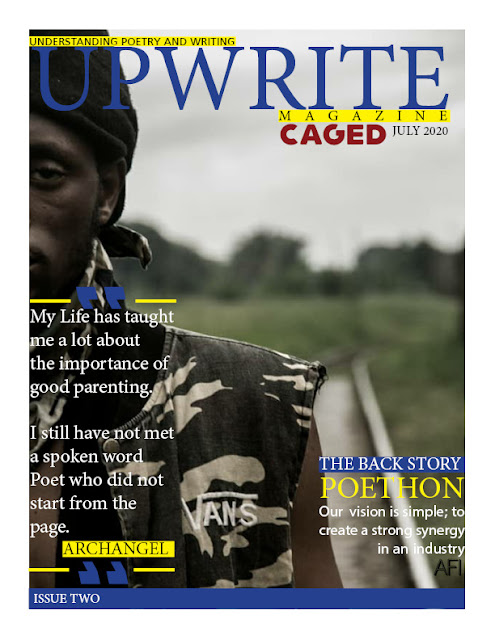ESSAY: LOOK AT ME IN THE FACE IF YOU LOVE ME, I'M FROM THE EAST by Nnadube Jonathan Ejiogu
It is common knowledge that the worldview of a particular group goes to determine the behavioral patterns of any social group. Worldview suggests how people perceive and explain their cosmology. If this is any definition to go by, one would then be committing an error to prejudge the culture of a group of people by the standards of a different cultural group. This, in no small measure, explains the misconceptions and rift among cultural groups within a multicultural environment as Nigeria.
A critical pointification here, will define a phenomenon that has captured my attention recently : The concept of looking one in the face. The predominant ethnic groups in Nigeria are Yoruba, Igbo and Hausa, but for the sake of what drives my discourse here, my focus will ray on the Yorubas and Igbos. The aforementioned groups occupy different geographical borders; but beyond this, their distinct worldview distances them. One of such worldview, would be the phenomenon of what “looking someone in the face” signifies to these groups.
Within the Yoruba tradition, this concept of looking one in the face transcends the immediacy of that action into the ideals of what constitutes respect.
Arguably, this is why respectable people such as traditional rulers or Older persons are greeted in a way that they are not directly looked at in the face. This veil of cultural consciousness presupposes why it is considered an offence within this traditional milieu for one to converse with an elderly person or one that demands reverence, with an
 unflinching gaze directly on the older person's face. The idea that culminates with this understanding explains better the conception behind the Yoruba sentence -- Ma je kin wo oju yin. To “Wo Oju Eyan” suggests an unpleasant action. Malevolence, or one considered to be disrespectful. When such a statement is uttered, it could be termed as a reluctance in demonstrating an unfavourable action which a situation demands. Intuitively, the philosophy behind this statement can be traced back to the concept of what is acknowledged as Yoruba's way of respect. The speaker making such a statement is aware that looking at an elder in the face is antithetical to acceptable behavioural pattern; this becomes the overarching rationale behind the forewarning that such statement arms the recipient with. To “wo ju eyan: look into the face Ultimately serves as an umbrella statement that implores that the speaker has taken a disrespectful action (for whatever reason). Suffice to say that in becoming the phrase/marker to encapsulate a disrespectful act, indicates a testament of the fact that it is anti-Yoruba tradition to boldly look an elder in the face.
unflinching gaze directly on the older person's face. The idea that culminates with this understanding explains better the conception behind the Yoruba sentence -- Ma je kin wo oju yin. To “Wo Oju Eyan” suggests an unpleasant action. Malevolence, or one considered to be disrespectful. When such a statement is uttered, it could be termed as a reluctance in demonstrating an unfavourable action which a situation demands. Intuitively, the philosophy behind this statement can be traced back to the concept of what is acknowledged as Yoruba's way of respect. The speaker making such a statement is aware that looking at an elder in the face is antithetical to acceptable behavioural pattern; this becomes the overarching rationale behind the forewarning that such statement arms the recipient with. To “wo ju eyan: look into the face Ultimately serves as an umbrella statement that implores that the speaker has taken a disrespectful action (for whatever reason). Suffice to say that in becoming the phrase/marker to encapsulate a disrespectful act, indicates a testament of the fact that it is anti-Yoruba tradition to boldly look an elder in the face.In contrast with the Igbo tradition, the philosophy of looking one in the face resonates with its unalloyed linguistic interpretation in Igbo known as “Ihu n'anya”. Although, today, what is readily offered as the meaning of this Igbo sentence is “Love”. Love however, offers only an encompassing meaning that will form the basis of the argument here. Within the Igbo ethos, the ideal of love has a lot to do with looking at one in the face. The Igbos believe that the direct corollary of love are appreciation, acceptance, respect, and so on.
The ideation of this presupposes why an Igbo person must not only look at another in the face but that, at least, (s)he puts on an “ihuoma” (a good face), if the relationship between the person and the recipient is not strained by grudge. Thus, quite naturally, within this setting, there is an unvocalized assumption that when one averts his face from fixing it on the recipient's, then mischief, grudge, aversion, dissatisfaction and whatnot is in the offing. Invariably, the fixation of eye contact does not suggest disrespect to the Igbos rather it is a nonverbal communication that supplements agreement. This cultural construct can be readily ascribed to the reason why most of the times, except for very rare cases, Igbos greet in such a manner that gives them the opportunity to see the face of the recipient (and vice versa). Indeed, because this communicative cultural code projects agreement, acceptance and respect, today, “Ihu n'anya” transcends this communicative matrix into the constructivism of love.
Consequently, for the Igbos, if you love me, you will look at me in the face. The coexistence of ethnic groups in Nigeria has continued to be fraught with discrimination, and intolerance which streams from the occluding of rational thinking and the unwillingness to appreciate beauty in diversity. Until, Nigerians start seeing the error in measuring the correctness of another's culture from one's own culture, then ethnic rivalry will continue to manifest.





Comments
Post a Comment